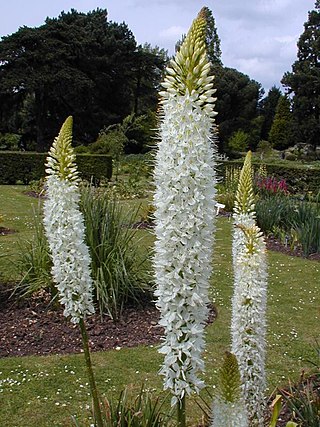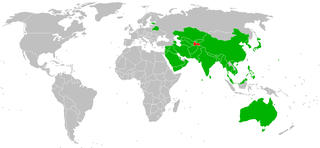
Central Asia is a subregion of Asia that stretches from the Caspian Sea in the southwest and Eastern Europe in the northwest to Western China and Mongolia in the east, and from Afghanistan and Iran in the south to Russia in the north. It includes Kazakhstan, Kyrgyzstan, Tajikistan, Turkmenistan, and Uzbekistan. The countries as a group are also colloquially referred to as the "-stans" as all have names ending with the Persian suffix "-stan" in both respective native languages and most other languages.

Gagea is a large genus of spring flowers in the lily family. It is found primarily in Eurasia with a few species extending into North Africa and one species in North America.

Leonurus (motherwort) is a genus of flowering plants in the family Lamiaceae. It is native to Europe and Asia, naturalized in New Zealand, Hawaii, New Caledonia, and much of North and South America.

Lagochilus is a genus of the mint family that contains Turkistan mint . It is native to central, south-central, and eastern Asia.

Hyles hippophaes, the seathorn hawk-moth, is a species of moth in the family Sphingidae. The species was first described by Eugenius Johann Christoph Esper in 1789.

Eremurus is a genus of deciduous perennial flowers in the family Asphodelaceae. They are also known as the foxtail lilies or desert candles. They are native to eastern Europe in, and temperate Asia from Turkey to China, with many species in Central Asia.

Hemipenthes is a large genus of flies belonging to the family Bombyliidae (bee-flies). There are many described species, distributed throughout the Holarctic realm. These are small to large robust flies with a body length of 5–14 mm. They can be distinguished from similar genera (Villa) by their wing venation. A number of species formerly in this genus were moved to a separate genus, ins in 2020.

Cancrinia is a genus of flowering plants in the aster family, Asteraceae. They are native to central Asia, where they are distributed in China, Mongolia, and Russia.
This page shows the Kyrgyzstan national football team's results in International Matches, as recognized by FIFA:

Galeodes is a genus of solifuges or sun spiders. The nearly 200 species in this genus are found in northern Africa, southeastern Europe and Asia. Like other solifuges, they are mainly nocturnal and found in arid habitats. They often have long hairy appendages and are not as stout bodied or dark and contrastingly coloured as some other solifuges. Some Galeodes species are able to produce sounds by stridulation. These are usually raspy or hiss-like and may be imitations of the sounds of vipers, to serve a defensive function. As in other solifuges, mating involves the male depositing a spermatogonia that is manipulated into the female genital opening using their chelicera. The male strokes the female using the palps allowing her to be approached. Females will often feed on males before or after mating. The female then deposits the eggs in a burrow in soil and in some species guards them.

This page shows the Tajikistan national football team's results in International Matches, as recognized by FIFA:

The 2022 SCO summit was the 22nd annual summit of heads of state of the Shanghai Cooperation Organisation held between 15 and 16 September 2022 in Samarkand, Uzbekistan.
Biton is a genus of daesiid camel spiders, first described by Ferdinand Karsch in 1880.
Gluviopsis is a genus of daesiid camel spiders, first described by Karl Kraepelin in 1899.
Karschiidae is a family of solifuges, first described by Karl Kraepelin in 1899.

Paragaleodes is a genus of galeodid camel spiders (solifuges), first described by Karl Kraepelin in 1899.
Eusimonia is a genus of karschiid camel spiders, first described by Karl Kraepelin in 1899.
Rhagodes is a genus of rhagodid camel spiders, first described by Reginald Innes Pocock in 1897.
Gylippus is a genus of gylippid camel spiders, first described by Eugène Simon in 1879.











